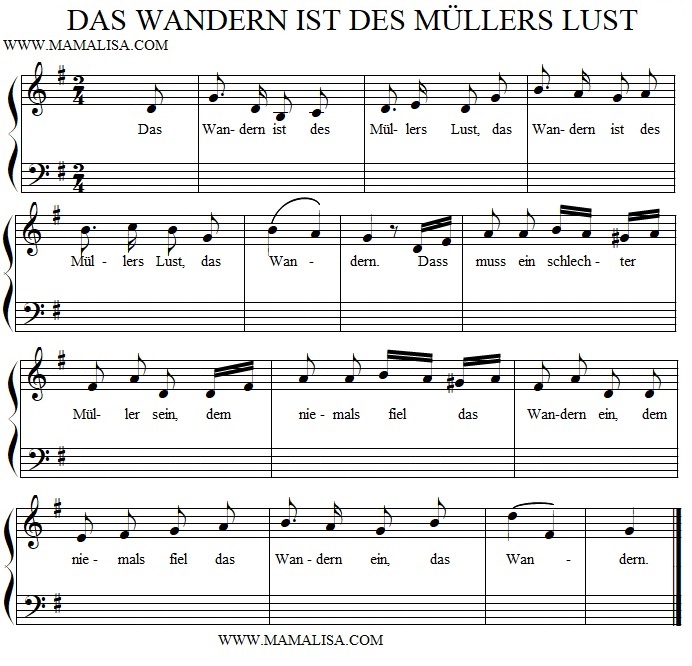Das Wandern ist des Müllers Lust
Das Wandern ist des Müllers Lust
Wandering is the Miller's Delight
Traditional Song
Traditional Song
(German)
(English)
Das Wandern ist des Müllers Lust,
das Wandern.
Das muß ein schlechter Müller sein,
dem niemals fiel das Wandern ein,
das Wandern.
Vom Wasser haben wir's gelernt,
vom Wasser:
Das hat nicht Rast bei Tag und Nacht,
ist stets auf Wanderschaft bedacht,
das Wasser.
Das sehn wir auch den Rädern ab,
den Rädern:
Die gar nicht gerne stille stehn,
die sich mein Tag nicht müde drehn,
die Räder.
Die Steine selbst, so schwer sie sind,
die Steine,
sie tanzen mit den muntern Reih'n
und wollen gar noch schneller sein,
die Steine.
O Wandern, Wandern meine Lust,
o Wandern!
Herr Meister und Frau Meisterin,
laßt mich in Frieden weiter ziehn
und wandern.
Wandering is the miller's delight,
Wandering.
He must be a bad miller,
He who never thinks of wandering,
Wandering.
We learned from the water,
From the water:
It doesn't rest day and night,
It's always on the move,
The water.
We can see that from the wheels
The wheels.
They don't like to stand still,
They are not tired all day long,
The wheels.
The millstones themselves, heavy as they are,
The millstones,
They dance with the cheerful rows
And want to be even faster
The millstones.
O wandering, wandering my delight,
O wandering!
Master and Mistress,
Let me go on in peace
And wander!
Notes
"Das Wandern ist des Müllers Lust" ("To Wander is the Miller's Delight") is the first line of a poem by Wilhelm Müller, written in 1821, under the title "Wanderschaft" (Wandering). It was part of the collection called, "Die schöne Müllerin" (The Beautiful Miller). While "wander" is defined as "hiking" today, when written, it referred to the required years of training of a journeyman, in this case of a miller.
The poem was often set to music, notably by Franz Schubert in 1823, under the title "Das Wandern" (The Walk), as part of his song cycle, "Die schöne Müllerin". It was also set to music by Carl Friedrich Zöllner, who wrote a four-voice choral composition to it in 1844. With his melody, the poem became a popular German song, and also walking song. -Adapted from Wikipedia


Thanks!
Thanks!
Thanks!
Thanks and Acknowledgements
Translated by Monique Palomares.


























